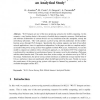Free Online Productivity Tools
i2Speak
i2Symbol
i2OCR
iTex2Img
iWeb2Print
iWeb2Shot
i2Type
iPdf2Split
iPdf2Merge
i2Bopomofo
i2Arabic
i2Style
i2Image
i2PDF
iLatex2Rtf
Sci2ools
IFIP
2003
Springer
2003
Springer
Power-Saving in Wi-Fi Hotspots: An Analytical Study
Wi-Fi hotspots are one of the most promising scenarios for mobile computing. In this scenario, a very limiting factor is the scarcity of mobile-device energetic resources. Both hardware and software architectures of current devices are very inefficient from this standpoint, mainly the networking subsystem. This work analyzes a power-saving network architecture for the mobileInternet access through Wi-Fi hotspots. Specifically, this solution supports any kind of best-effort network applications, since it is application-independent. In this paper we derive a complete analytical model of the power-saving system when applied to mobile Web access. Furthermore, we use this model to compare our solution with a well-known approach, i.e., the Indirect-TCP. The comparison is performed by considering two performance figures: the energy saved in downloading a Web page and the related transfer-time. The results show that, in the average, our solution saves up to 78% of the energy. Furthermore, t...
Communications | IFIP 2003 | Mobile-device Energetic Resources | Power-saving Network Architecture | Wi-Fi Hotspots |
| Added | 07 Jul 2010 |
| Updated | 07 Jul 2010 |
| Type | Conference |
| Year | 2003 |
| Where | IFIP |
| Authors | Giuseppe Anastasi, Marco Conti, Enrico Gregori, Andrea Passarella |
Comments (0)

